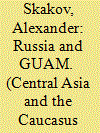| Srl | Item |
| 1 |
ID:
088526


|
|
|
|
|
| Publication |
2009.
|
| Summary/Abstract |
Until the summer of 2008 the situation in the Caucasus was determined by the balance of power and parity between the main actors-America and Russia; there were other actors as well-the European Union, Turkey, and Iran. It was Georgia that wanted to defrost the situation in order to change the format of the peacekeeping operation and join NATO. Control over the breakaway regions and the status of the region's leader were its final aims.
The United States and the EU (NATO) would not have objected to a change in the balance of powers: not satisfied by a situation in which they had to trim their ambitions to suit the interests of others, they believed that the level of their presence in the region was inadequate. The conflicts in Abkhazia and South Ossetia served as defrosting instruments: for a long time the situation around them was teetering on the brink of war. In pursuance of their short-term interests the outside players were deliberately shortening the road to NATO for Georgia.
|
|
|
|
|
|
|
|
|
|
|
|
|
|
|
|
| 2 |
ID:
118755


|
|
|
|
|
| Publication |
2012.
|
| Summary/Abstract |
By mid-2011, the Republic of South Ossetia (RSO) was gradually sliding into the abyss of a political, social, and economic crisis. The people of South Ossetia had lost confidence in those who ruled them: the republican leaders were making too many mistakes, the republican elite were bogged in contradictions, while postwar rehabilitation was deliberately slowed down. This and the conviction, very popular in the Russian public (and even in the expert community), that the rehabilitation money was being shamelessly embezzled served as another argument in the political struggle raging in the RSO.
Very much as usual, an external factor (in this case Russia) merely added to the far from simple situation. I have in mind certain bureaucrats accustomed to semi-military discipline and "gray practices."
|
|
|
|
|
|
|
|
|
|
|
|
|
|
|
|
| 3 |
ID:
082123


|
|
|